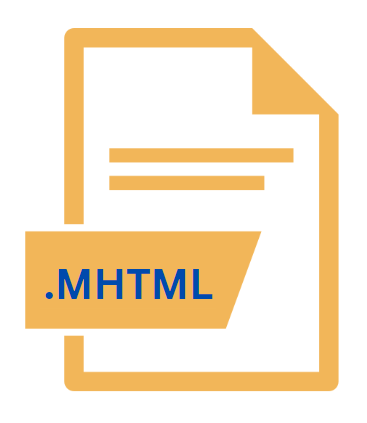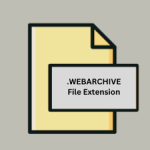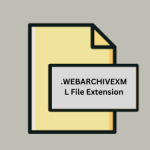.MHTML File Extension

What is an MHTML file?
The .MHTML file extension stands for MIME HTML (Multipurpose Internet Mail Extensions Hypertext Markup Language).
It is a web page archive format used to save web pages, including their resources such as images, scripts, and stylesheets, into a single file.
This file format allows users to save a complete web page in a single file, making it easier to store and share web content offline.
More Information.
The .MHTML format’s history is closely tied to the development of web technologies and email protocols.
As the web grew, the need for a standardized method to save complete web pages, including multimedia and other resources, became apparent.
MIME, which was initially developed for email to handle multimedia content, provided a robust framework for this purpose.
In the late 1990s, Microsoft integrated the .MHTML format into its Internet Explorer browser and other products.
The initial purpose was to allow users to save web pages in a format that preserved the complete content and layout, including images and stylesheets, in a single file. This was particularly useful for offline browsing and archival purposes.
Origin Of This File.
The .MHTML file format originated from the need to bundle and archive web pages into a single file for ease of storage and sharing.
It leverages MIME, a standard for formatting non-text files for email, to encode HTML content and its associated resources into a single document.
This approach emerged in the late 1990s when the web was expanding rapidly, and users sought more efficient ways to save and manage web content.
File Structure Technical Specification.
The .MHTML file format is essentially a MIME-encoded file that contains an HTML document along with its embedded resources.
The file structure is a multipart format that consists of several parts, each separated by MIME boundaries.
- Header: The file starts with a MIME header that specifies the content type and boundary markers. The content type for .MHTML files usually
multipart/related, indicating that the file contains multiple related parts. - HTML Content: The main part of the .MHTML file contains the HTML document. This part includes the HTML code that defines the web page’s structure and content.
- Resources: Following the HTML content, the file includes additional parts for resources such as images, scripts, and stylesheets. Each resource is encoded and referenced within the HTML document using MIME boundaries.
- Boundary Markers: Boundary markers are used to separate different parts of the file. Each part starts with a boundary marker and includes headers that define the content type and encoding.
The technical specification for .MHTML files ensure that all components of a web page are preserved in a single file. This makes it possible to view the saved web page offline exactly as it appeared online.
How to Convert the File?
Converting .MHTML files can be useful for compatibility or editing purposes. Here are some common methods to convert .MHTML files:
- To PDF: Many users convert .MHTML files to PDF for easier sharing and printing. This can be done using web browsers (such as Google Chrome) or dedicated conversion tools. In Google Chrome, open the .MHTML file, then choose “Print” and select “Save as PDF.”
- To HTML: To convert .MHTML files back to HTML, you can use specialized software or online conversion tools. Some text editors and web browsers can also save .MHTML files as HTML.
- To Other Formats: Various online tools and software can convert .MHTML files to different formats, including DOCX, TXT, or image formats. Choose a converter based on the desired output format.
Advantages And Disadvantages.
Advantages:
- Complete Archival: The .MHTML format saves the entire web page, including all embedded resources, in a single file. This ensures that the saved page looks and functions exactly as it did online.
- Ease of Sharing: Since the entire web page is contained in a single file, it is easier to share and distribute. This is useful for archival purposes or sharing web content with others.
- Offline Access: Users can access the saved web page offline without needing an internet connection. This is beneficial for reviewing content when an internet connection is not available.
- Preservation of Layout: The format preserves the web page’s layout and design, including images, styles, and scripts, ensuring that the saved page appears as intended.
Disadvantages:
- File Size: .MHTML files can become large, especially if the web page contains many resources. This can make them cumbersome to manage and transfer.
- Compatibility Issues: Not all web browsers and applications fully support the .MHTML format. This can lead to issues when trying to open or view .MHTML files in different environments.
- Limited Editing: Editing .MHTML files can be challenging due to their complex structure. Users may need specialized tools to modify the content within these files.
- Security Concerns: Because .MHTML files can contain executable scripts and other resources, they may pose security risks if they originate from untrusted sources.
How to Open MHTML?
Open In Windows
- Internet Explorer: Internet Explorer natively supports .MHTML files. Simply double-click the file to open it in Internet Explorer.
- Microsoft Edge: Recent versions of Microsoft Edge also support .MHTML files. Open the file by dragging it into the browser or using the “Open File” option.
- Google Chrome: Google Chrome can open .MHTML files by using the “Open File” option or by dragging the file into the browser window.
Open In Linux
- Google Chrome/Chromium: On Linux, Google Chrome or Chromium can be used to open .MHTML files. Use the “Open File” option or drag the file into the browser.
- Specialized Tools: Some Linux tools and utilities may be required to view or convert .MHTML files, as native support can vary.
Open In MAC
- Safari: Safari does not natively support .MHTML files. You may need to use a third-party application or browser extension to open them.
- Google Chrome: As with Windows, Google Chrome on Mac can open .MHTML files by dragging them into the browser or using the “Open File” option.













